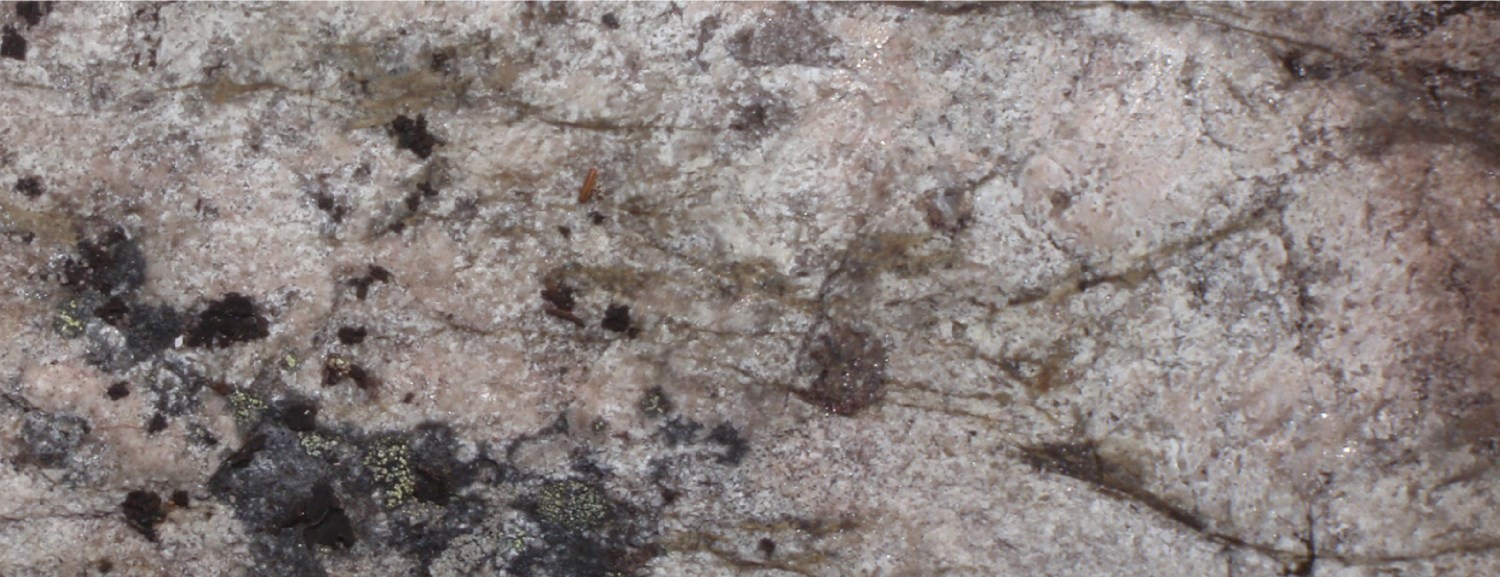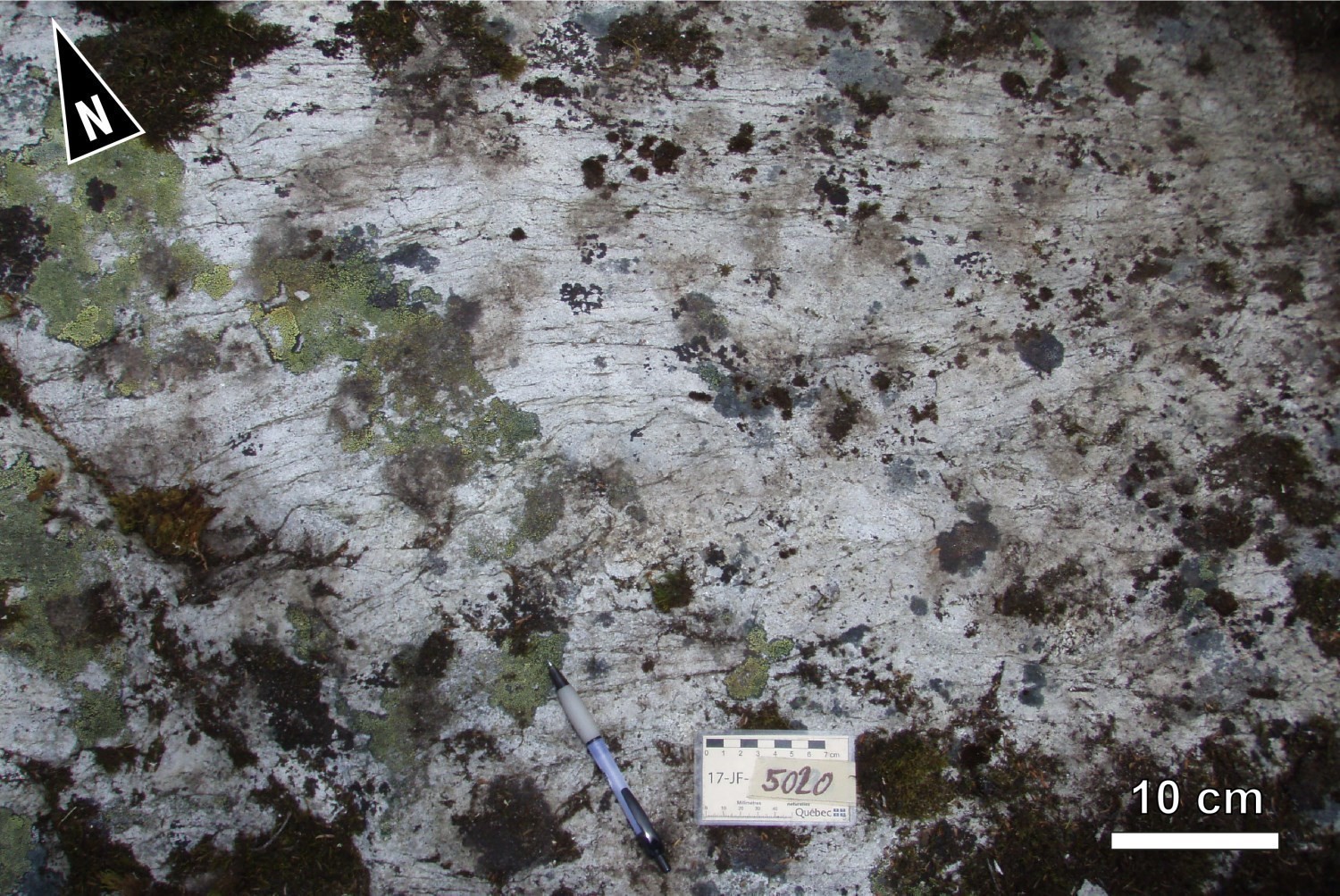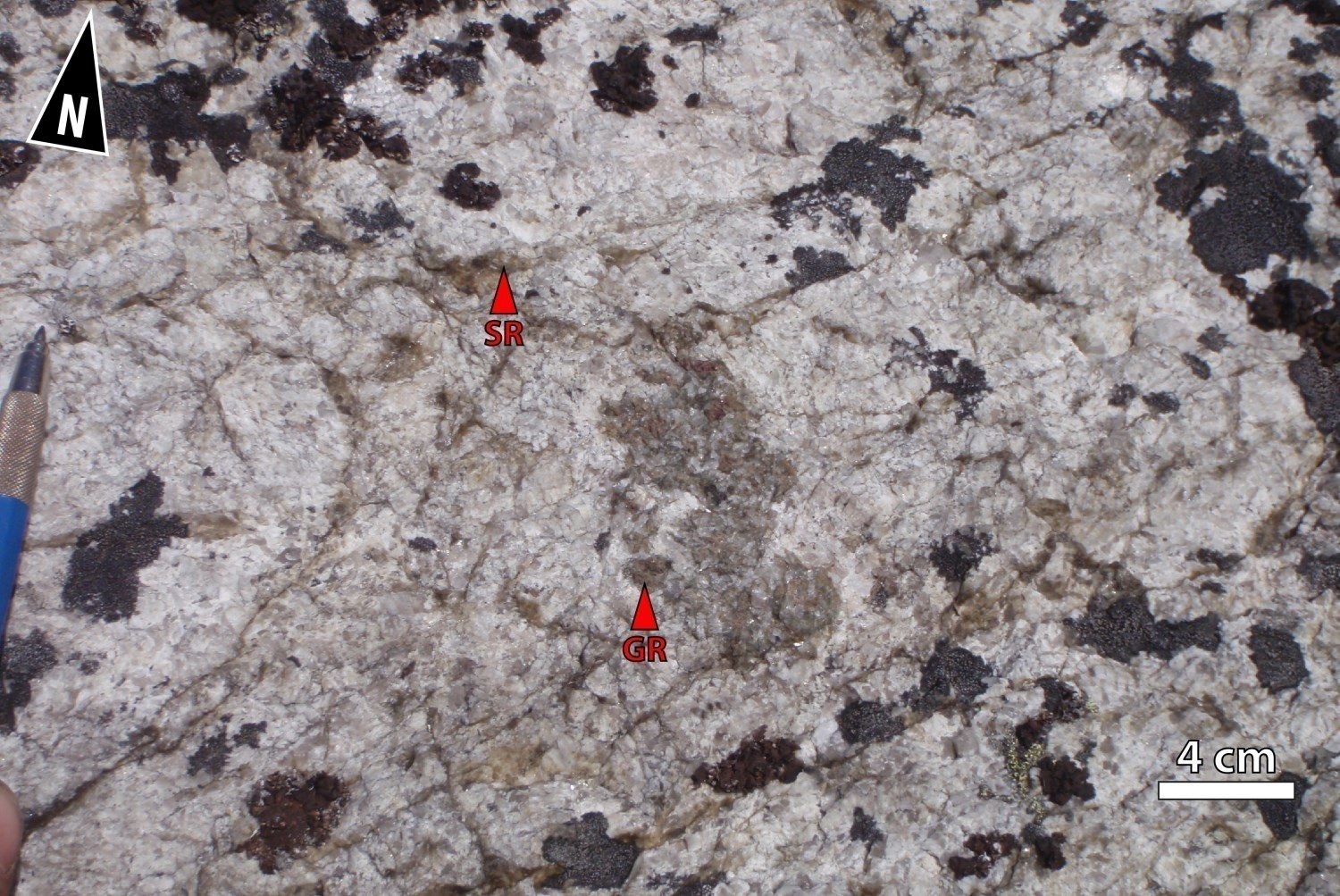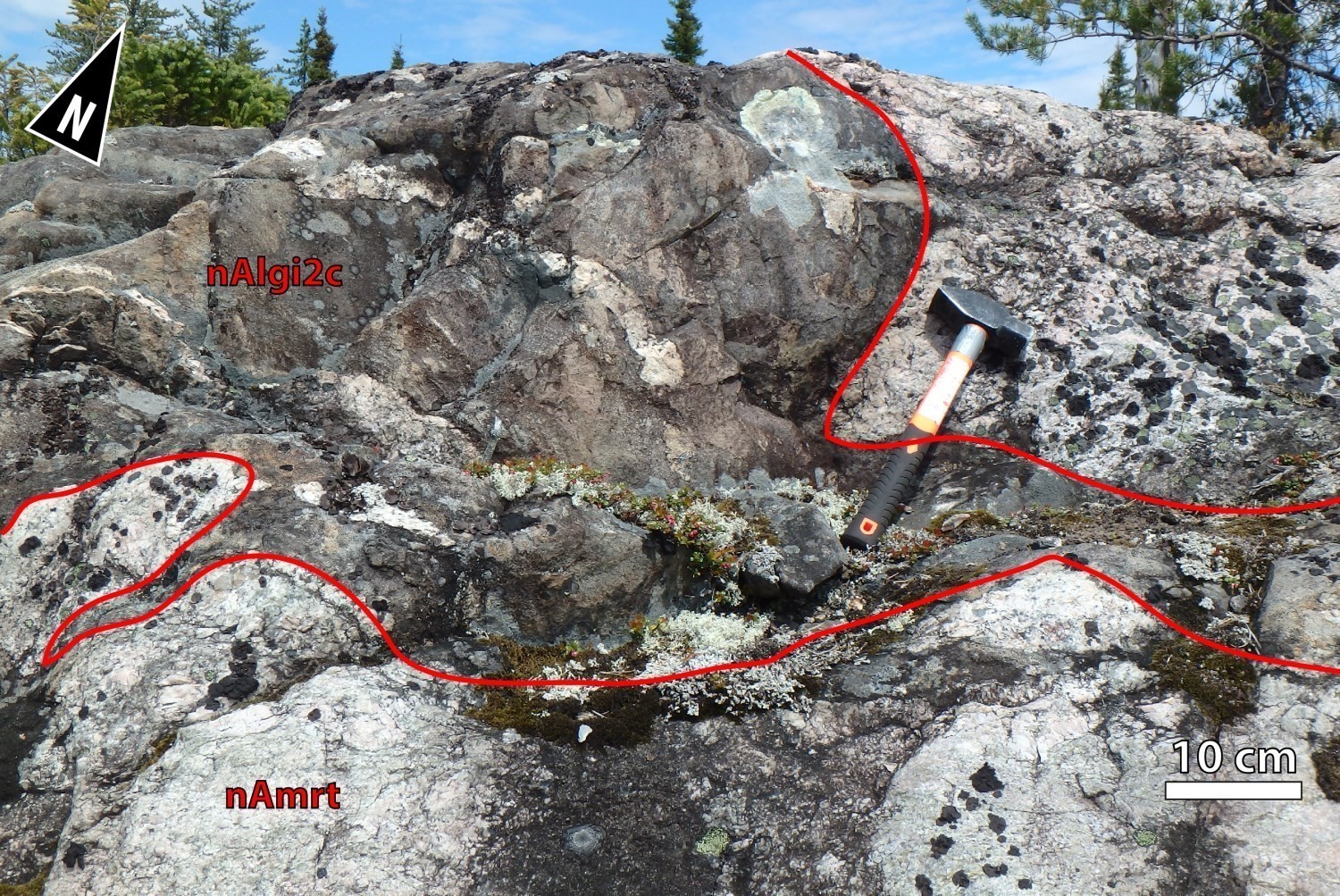
Last modified: 4 December 2020
DISCLAIMER: This English version is translated from the original French. In case of any discrepancy, the French version shall prevail.
| Author: | Beauchamp et al., 2018 |
| Age: | Neoarchean |
| Stratotype: | Outcrop 17-JF-5020, located at the top of the Otish Mountains, is typical of the Martel Suite |
| Type area: | Bohier Island and Cadieux Lake areas (NTS sheets 33A01 and 33A02) |
| Geological province: | Superior Province |
| Geological subdivision: | Opinaca Subprovince |
| Lithology: | Granite |
| Category: | Lithodemic |
| Rank: | Suite |
| Status: | Formal |
| Use: | Active |
None
Background
Rocks of the Martel Suite were originally part of the Lac Barou Massif described by Hocq (1985). This massif was divided into several units by Beauchamp et al. (2018) following mapping work conducted by the Ministère. They separated rocks of the Martel Pluton which, unlike other granites of the Otish Mountains, have a banded appearance and contain more sericite. Because two intrusive masses were identified in sheets 33A01 and 33A02, the Martel Pluton became the Martel Suite (Beauchamp, 2020).
Description


 The Martel Suite entirely consists of fairly light grey-white granite, locally greenish in altered surface and light pinkish white in fresh exposure. This granite is medium to coarse-grained, massive to slightly foliated, with pegmatitic clusters in places. The Martel Suite is distinguished from other granites in the area by its white mica content and the resulting banded appearance. Indeed, the Martel Suite granite contains quartz, microcline, abundant plagioclase and 1 to 4% well-crystallized muscovite flakes. In thin sections, muscovite is locally observed as intergrowth with chlorite or biotite forming symplektitic bundles, which marks rapid and primary crystallization. White mica also appears as veinlets. These veinlets actually represent fractures opened during a brittle deformation event and later filled with secondary sericite±chlorite±biotite. At the microscopic scale, it is clear that mica veinlets cut quartz and feldspar crystals. Early ductile deformation is also marked by undulatory extinction of quartz. The rock also contains 1 to 2% millimetric red to black euhedral garnet and ~1% biotite. In some cases, garnet crystals are either randomly distributed or aligned with magmatic banding. In thin section, garnet is poikiloblastic and altered to chlorite ± sericite. It is not uncommon to see a graphic texture on outcrop. The main alterations are weak to moderate hematitization and damouritization, both of which affect plagioclase. The Martel Suite contains many enclaves of Laguiche Complex migmatized paragneiss (nAlgi2c). Granitic pegmatites clearly cut rocks of Martel Suite.
The Martel Suite entirely consists of fairly light grey-white granite, locally greenish in altered surface and light pinkish white in fresh exposure. This granite is medium to coarse-grained, massive to slightly foliated, with pegmatitic clusters in places. The Martel Suite is distinguished from other granites in the area by its white mica content and the resulting banded appearance. Indeed, the Martel Suite granite contains quartz, microcline, abundant plagioclase and 1 to 4% well-crystallized muscovite flakes. In thin sections, muscovite is locally observed as intergrowth with chlorite or biotite forming symplektitic bundles, which marks rapid and primary crystallization. White mica also appears as veinlets. These veinlets actually represent fractures opened during a brittle deformation event and later filled with secondary sericite±chlorite±biotite. At the microscopic scale, it is clear that mica veinlets cut quartz and feldspar crystals. Early ductile deformation is also marked by undulatory extinction of quartz. The rock also contains 1 to 2% millimetric red to black euhedral garnet and ~1% biotite. In some cases, garnet crystals are either randomly distributed or aligned with magmatic banding. In thin section, garnet is poikiloblastic and altered to chlorite ± sericite. It is not uncommon to see a graphic texture on outcrop. The main alterations are weak to moderate hematitization and damouritization, both of which affect plagioclase. The Martel Suite contains many enclaves of Laguiche Complex migmatized paragneiss (nAlgi2c). Granitic pegmatites clearly cut rocks of Martel Suite.
From a geochemical perspective (Beauchamp, 2020), the composition of Martel Suite rocks is very homogeneous and characterized by low content in Fe2O3T (0.44-1.27%) and MgO (0.03-0.14%) as well as higher K2O content (3.61-6.8%) than other felsic intrusions of the area. Regarding trace elements, samples analyzed are distinguished by their very low contents in Sr (13-61 ppm), Ba (26-175 ppm) and V (below the detection limit). The Martel Suite is peraluminous and similar to S-type iron-rich granitoids (Maniar and Piccoli, 1989; Frost et al., 2001). Rocks are calc-alkaline to alkaline in affinity (Frost et al., 2001). The rare earths diagram is arched, V-shaped and has a large negative Eu anomaly (Palme and O’Neill, 2004). The profiles show a slight enrichment in heavy rare earth elements because of garnet in the rock. Very strong negative anomalies in Nb, Ce, Ti, and positive anomalies in Th P, and Hf appear on the spider diagram normalized to the primitive mantle (McDonough and Sun, 1995).
Thickness and Distribution
The Martel Suite corresponds to two intrusive masses that straddle between sheets 33A01 and 33A02. It outcrops on topographic peaks at the western end of the Otish Mountains.
Dating
None.
Stratigraphic Relationship(s)
Relationships seen on the map indicate that the Martel Suite intrusion occurred after the Barou Intrusion and Pisim Pluton. It also postdates the Laguiche Complex. Contacts are intrusive with these units. The Martel Suite is also cut by a diabase dyke belonging to the Mistassini Dyke Swarm (<2515 ±3 Ma, >2503 ±2 Ma; Hamilton, 2009; Davis et al., 2018).
Paleontology
Does not apply.
References
Publications available through SIGÉOM Examine
BEAUCHAMP, A M. 2020. Géologie de la région du lac Cadieux, sous-provinces d’Opatica et d’Opinaca, Eeyou Istchee Baie-James, Québec, Canada. MERN. BG 2019-02, 1 plan.
BEAUCHAMP, A M., MASSEI, F., DAOUDENE, Y. 2018. Géologie de la région de l’île Bohier, au contact entre les sous-provinces d’Opatica, d’Opinaca et le bassin d’Otish, au nord de Mistissini, Eeyou Istchee Baie-James, Québec, Canada. MERN. BG 2018-02, 2 plans.
DAVIS, D W., LAFRANCE, I., GOUTIER, J., BANDYAYERA, D., TALLA TAKAM, F., GIGON, J. 2018. DATATIONS U-PB DANS LES PROVINCES DE CHURCHILL ET DU SUPERIEUR EFFECTUEES AU JSGL EN 2013-2014. MERN. RP 2017-01, 63 pages.
HAMILTON, M A. 2009. DATATION ISOTOPIQUE (U-PB) D’UN DIABASE DE L’ESSAIM DE DYKES MISTASSINI, QUEBEC – U-PB ISOTOPIC OF A DIABASE DYKE OF THE MISTASSINI SWARM, QUEBEC. UNIVERSITY OF TORONTO, JACK SATTERLY GEOCHRONOLOGY LABORATORY. MB 2009-17, 13 pages.
HOCQ, M. 1985. GEOLOGIE DE LA REGION DES LACS CAMPAN ET CADIEUX, TERRITOIRE-DU-NOUVEAU-QUEBEC. MRN. ET 83-05, 190 pages et 4 plans.
Other publications
FROST, B.R., BARNES, C.G., COLLINS, W.J., ARCULUS, R.J., ELLIS, D.J., FROST, C.D. 2001. A geochemical classification for granitic rocks. Journal of Petrology; volume 12, numéro 11, pages 2033-2048. https://doi.org/10.1093/petrology/42.11.2033
MANIAR, P.D., PICCOLI, P.M. 1989. Tectonic discrimination of granitoids. Geological Society of America Bulletin; volume 101, pages 635-643. https://doi.org/10.1130/0016-7606(1989)101%3C0635:TDOG%3E2.3.CO;2
MCDONOUGH, W.F., SUN, S.S. 1995. The composition of the Earth. Chemical Geology, volume 120, pages 223-253. https://doi.org/10.1016/0009-2541(94)00140-4
PALME, H., O’NEILL, H.S.C 2004. Cosmochemical estimates of mantle composition. In Treatise on Geochemistry. (Holland, H.D. and Turrekian, K.K. editors), Elsevier, Amsterdam, The Netherlands; volume 2, pages 1-38. https://doi.org/10.1016/B978-0-08-095975-7.00201-1
PEARCE, J.A., HARRIS, N. W., TINDLE, A.G. 1984. Trace element discrimination diagrams for the tectonic interpretation of granitic rocks. Journal of Petrology; volume 25, pages 956-983. https://doi.org/10.1093/petrology/25.4.956
Suggested Citation
Ministère de l’Énergie et des Ressources naturelles (MERN). Martel Suite. Quebec Stratigraphic Lexicon. https://gq.mines.gouv.qc.ca/lexique-stratigraphique/province-du-superieur/pluton-de-martel_en [accessed on Day Month Year].
Contributors
|
First publication |
Frédéric Massei, P. Geo., M.Sc. frederic.massei@mern.gouv.qc.ca (redaction) Mehdi A. Guemache, P. Geo., Ph.D. (coordination); Mélina Langevin, B.Sc. (critical review); Simon Auclair, P. Geo., M.Sc. (editing); Céline Dupuis, P. Geo., Ph.D. (English version); Ricardo Escobar Moran (HTML editing). |
|
Revision(s) |
Anne-Marie Beauchamp, Eng., M.Sc. anne-marie.beauchamp@mern.gouv.qc.ca (redaction) Mehdi A. Guemache, P. Geo., Ph.D. (coordination); Patrice Roy, P. Geo., M.Sc. (critical review); Simon Auclair, P. Geo., M.Sc. (editing); Céline Dupuis, P. Geo., Ph.D. (English version); André Tremblay (HTML editing). |

